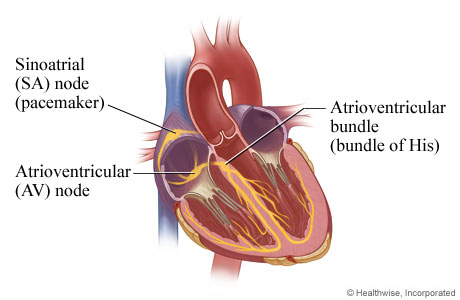Our Health Library information does not replace the advice of a doctor. Please be advised that this information is made available to assist our patients to learn more about their health. Our providers may not see and/or treat all topics found herein.
Topic Contents
Electrical System of the Heart
Overview


The heart has four chambers. The two upper chambers are called atria (the right atrium and the left atrium), and the two lower chambers are called ventricles.
Normally, the heartbeat starts in the right atrium in a group of special heart cells called the sinoatrial (or sinus) node. These cells act as a pacemaker for the heart.
The heart's pacemaker sends out an electrical signal (impulse) that spreads throughout the heart along electrical pathways. These pathways transmit the signal from the upper to the lower chambers of the heart, which causes the heart muscle to contract. Regular, rhythmic electrical signals keep the heart pumping blood to the lungs and the body.
What controls the timing of your heartbeat?
Your heart's electrical system controls the timing of your heartbeat by regulating your:
- Heart rate, which is the number of times your heart beats per minute.
- Heart rhythm, which is the synchronized pumping action of your four heart chambers.
Your heart's electrical system should maintain:
- A steady heart rate of about 60 to 100 beats per minute at rest. The heart's electrical system also increases this rate to meet your body's needs during physical activity and lowers it during sleep.
- An orderly contraction of your atria and ventricles (this is called a sinus rhythm).
What makes your heart rate speed up or slow down?
The cells of the SA node at the top of the heart are known as the pacemaker of the heart because the rate at which these cells send out electrical signals determines the rate at which the entire heart beats (heart rate).
The normal heart rate for an adult at rest ranges between about 60 and 100 beats per minute. Your heart rate can adjust higher or lower to meet your body's needs.
Your brain and other parts of your body send signals to stimulate your heart to beat either at a faster or a slower rate. Although the way all of the chemical signals interact to affect your heart rate is complex, the net result is that these signals tell the SA node to fire charges at either a faster or slower pace, resulting in a faster or a slower heart rate.
For example, during periods of exercise, when the body requires more oxygen to function, signals from your body cause your heart rate to increase significantly to deliver more blood (and therefore more oxygen) to the body. Your heart rate can increase beyond 100 beats per minute to meet your body's increased needs during physical exertion.
Similarly, during periods of rest or sleep, when the body needs less oxygen, the heart rate decreases. Some athletes actually may have normal heart rates well below 60 because their hearts are very efficient and don't need to beat as fast. Changes in your heart rate, therefore, are a normal part of your heart's effort to meet the needs of your body.
Related Information
Credits
Current as of: July 31, 2024
Author: Ignite Healthwise, LLC Staff
Clinical Review Board
All Ignite Healthwise, LLC education is reviewed by a team that includes physicians, nurses, advanced practitioners, registered dieticians, and other healthcare professionals.
Current as of: July 31, 2024
Author: Ignite Healthwise, LLC Staff
Clinical Review Board
All Ignite Healthwise, LLC education is reviewed by a team that includes physicians, nurses, advanced practitioners, registered dieticians, and other healthcare professionals.
This information does not replace the advice of a doctor. Ignite Healthwise, LLC disclaims any warranty or liability for your use of this information. Your use of this information means that you agree to the Terms of Use and Privacy Policy. Learn how we develop our content.
To learn more about Ignite Healthwise, LLC, visit webmdignite.com.
© 2024-2025 Ignite Healthwise, LLC.




